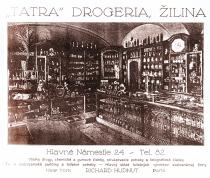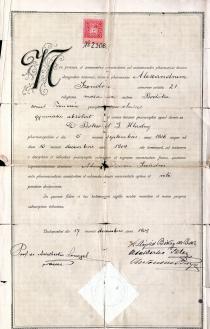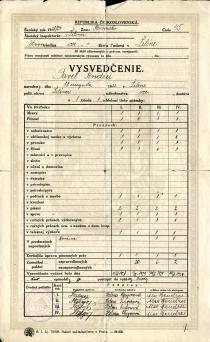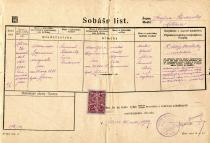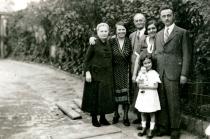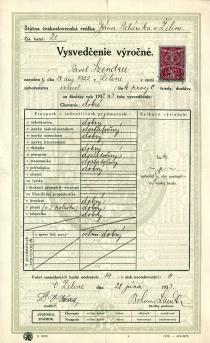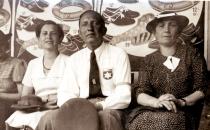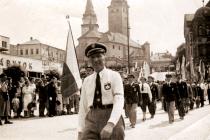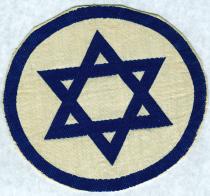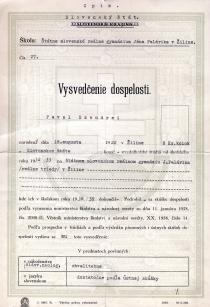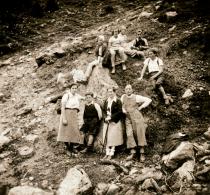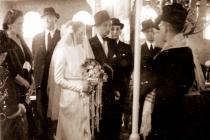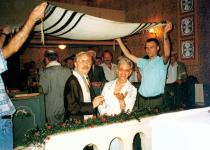
Pavel Sendrei
Subotica
Serbia
Interviewer: Klara Azulaj
Growing up
During the war
Post-war
My name is Pavel Sendrei. I was born on August 18, 1922 in Zilina
(Czechoslovakia). My father, Aleksandar Sendrei, was born on August 28,
1888 in Krivosud Bodovska, Slovakia. He was killed on March 15, 1945 in the
concentration camp at Bergen-Belsen. My mother, Adolfina Sendrei (maiden
name - Holzmann) was born on October 31, 1893 in Stari Bistira, and she
died on December 2, 1981 in Subotica.
I grew up in a middle class Neolog Jewish family. We did not go to
synagogue everyday, but we observed the big holidays. We lived in a rented
apartment. Hungarian was my mother tongue, because my father had finished
his studies at the university in Budapest and my mother went to a Hungarian
school during the time of the Austro-Hungarian Empire. I had a governess
who taught me German. I only began to learn Slovakian when I started the
first grade of primary school. After elementary school I enrolled in a
secondary school. I didn't have any problems with Slovakian. I graduated on
May 25, 1939.
As a young boy I was a member of the Makabi where we practiced
gymnastics and athletics and which was part of the Zionist society Makabi
Hazair. The members of this organization went on picnics, and camping trips
where we were taught dances, songs, Hebrew language and history. In 1937 I
participated in the Makabiada in Zilina and every year I went to the Makabi
Hazair camp. After 1940 this was interrupted because of the German
occupation of Slovakia.
Zilina had about 25,000 residents of which about 6,000 were Jews. One
of the deputy mayors was a Jew. During the war Zilina was a big camp. It
was a gathering camp where people were put into wagons and transported to
other camps.
My father, Aleksandar Sendrei, spent all day in his drugstore. He was
a big fan of football. He was a member of the ESKA ZILINA football club and
one of its big donors. This football club was once one of the leaders in
Slovakia. My mother, Adolfina Sendrei, was a classical housewife. She made
really tasty meals, but her cuisine was not kosher.
I do not remember either my maternal or paternal grandfathers, as they
died when I was quite small. I met my grandmothers, but I do not remember
them too clearly because they had both died around 1930.
My family gathered around my grandmother's sister Hermina Glazel. She
was a housewife, very communicative and always willing to make the best
reception for her guests. She was in fact the head of our family. She had
two married daughters in Zilina. Hermina had a big house with a huge garden
in which there were all kinds of fruits. All of our relatives would gather
here during the summers. We loved gathering in her garden in the summer
time. In the shade of the trees we used to drink cold drinks and talk about
everything. Those were moments of real relaxation.
I socialized exclusively with Jewish children. In my class in school
there were about 40 children, 11 of which were Jews. I was happy that there
were no arguments in my class between the Jewish pupils and the others. We
spent seven years together and were good friends all that time. My best
friend, Kornil Verthajn, and I sat on the same bench. We went together to
the Makabi Hazair. Kornil was deported together with his parents and
returned, but his parents did not survive the Holocaust. After the war I
helped him make aliyah from Czechoslovakia through Yugoslavia.
I remember that in school every week we had lessons with Rabbi Dr.
Fridman. He taught Hebrew language and the history of the Jewish people.
After graduation I worked in the drugstore until its "aryanization." Then I
got fired, and like many Jewish children, I attended an agricultural course
in the Jewish community. The course took place on rented agricultural
property. We cultivated the land ourselves, and sold everything that grew,
and that is how we survived. This lasted about a year. On that farm, we
worked for a living, but it wasn't in preparation for aliyah to Israel,
only for survival.
During that time my father, Aleksandar Sendrei, as a former member of
the social democratic party was imprisoned. My father wasn't an active
member of that party. He had a very good friend, who was a secretary in the
social democratic party and he persuaded my father not to register for the
party. So, my father was more like a passive member. From prison he was
taken to a concentration camp where he remained until the Slovakian
uprising in 1944, when he was liberated. After that he joined the
partisans, but quickly in one of the actions he fell into the hands of the
Germans and was deported to Bergen Belsen where he died on March 15, 1945
of typhus.
I was taken into forced labor until September 20, 1944. Then I saw
Jews being taken to the train station for deportation, and I decided to go
into hiding. My mother refused to go with me because she wanted to live in
her apartment and wait for father to come home. However, in October 1944
she was taken to Auschwitz and from there she was taken to a factory where
they made parts for airplanes in Sakis-bat-kudove, and from where she was
liberated on May 8, 1945. (Editor's note: Sakis-bat-kudove was in Germany,
5 kilometers from the border with the Czech Republic; the nearest town to
it was Nachod.)
Immediately after liberation, I was employed at the repatriation
office in Bratislava. The Jewish community in Bratislava had started its
work, and I was informed that the repatriation office needed employees.
Thanks to the fact that I speak several languages, Hungarian, German,
Slovakian and Czech, I was engaged in April 1945. The office belonged to
the Czech Office of Internal Affairs. I met my wife, Judita Bruck, and her
family while I was working in Bratislava. They went from the Strashov camp
to a work camp in Austria, where they were held until the war ended. They
went to Bratislava on foot and in a wagon and they ended up in the
repatriation office where I worked.
I liked Judita immediately, and because she was hungry most of the
time, whenever I could I took her to restaurants, sometimes three times a
day. Wishing to do something in return, Judita's father Matija invited me
to visit the family in Subotica (Yugoslavia). When I could, I accepted his
invitation and visited them in 1946. The love between Judita and me was
mutual, and we agreed to get married. We married in May l947 and went to
Czechoslovakia. On April 24, l949 Sonja, our daughter, was born.
After the war I worked for a short period in a drugstore, but when it
was nationalized I got work as a photoreporter in Czech TANJUG. I worked
there until the "Slansky trial." In Czechoslovakia antisemitism was
reestablished, and because of that I and another seventy Jews were expelled
from our jobs. In 1950 I was a member of the three-member presidency of the
Jewish community of Zilina. In 1956 the Jewish community received an
invitation to a reception with the Israeli ambassador in Prague. I went
with my wife Judita. We were the only members of the entire Jewish
community in Czechoslovakia who accepted the invitation, the rest were too
scared of the communists to go.
At the reception I met the secretary of the embassy who made aliyah
from Czechoslovakia in 1938 and whom I knew from our days back in Makabi.
He told us that the JOINT was helping as much as it could old Jews who had
survived the Holocaust, but that it was not something that was going
through the Jewish community rather through individuals who were willing to
help. Judita and I accepted this work and we worked until the end of March
1959 when we were arrested by the Czech government for allegedly "spying."
Later, we were accused of undermining the Republic of Czechoslovakia
because the JOINT were sending the money anonymously to survivors of the
Holocaust. Judita was imprisoned from March 29, 1957 to November 29, 1957
and I was incarcerated from March 29, 1957 until March 29, 1959.
After fulfilling my sentence, I could not find work and life was very
hard. Finally, we packed our things took our daughter, Sonja, and in
October 1962 we moved to Subotica, Yugoslavia where we live today.
In Subotica I was employed in the "Slavica" cosmetic factory where I
worked for a year. After that I was employed at the "Sever" electro-motor
factory as an export representative. I worked there for ten years. From
1974-1984 I worked as the head of international transport in "Dinamo
trans." I retired in 1984 with 43 years and 12 days of work experience. All
during this time I was very active in the Jewish community. From 1992-1993
I was secretary of the community. And now, my wife, Judita, and I enjoy
going to the community to celebrate the holidays and to participate in
cultural events.
